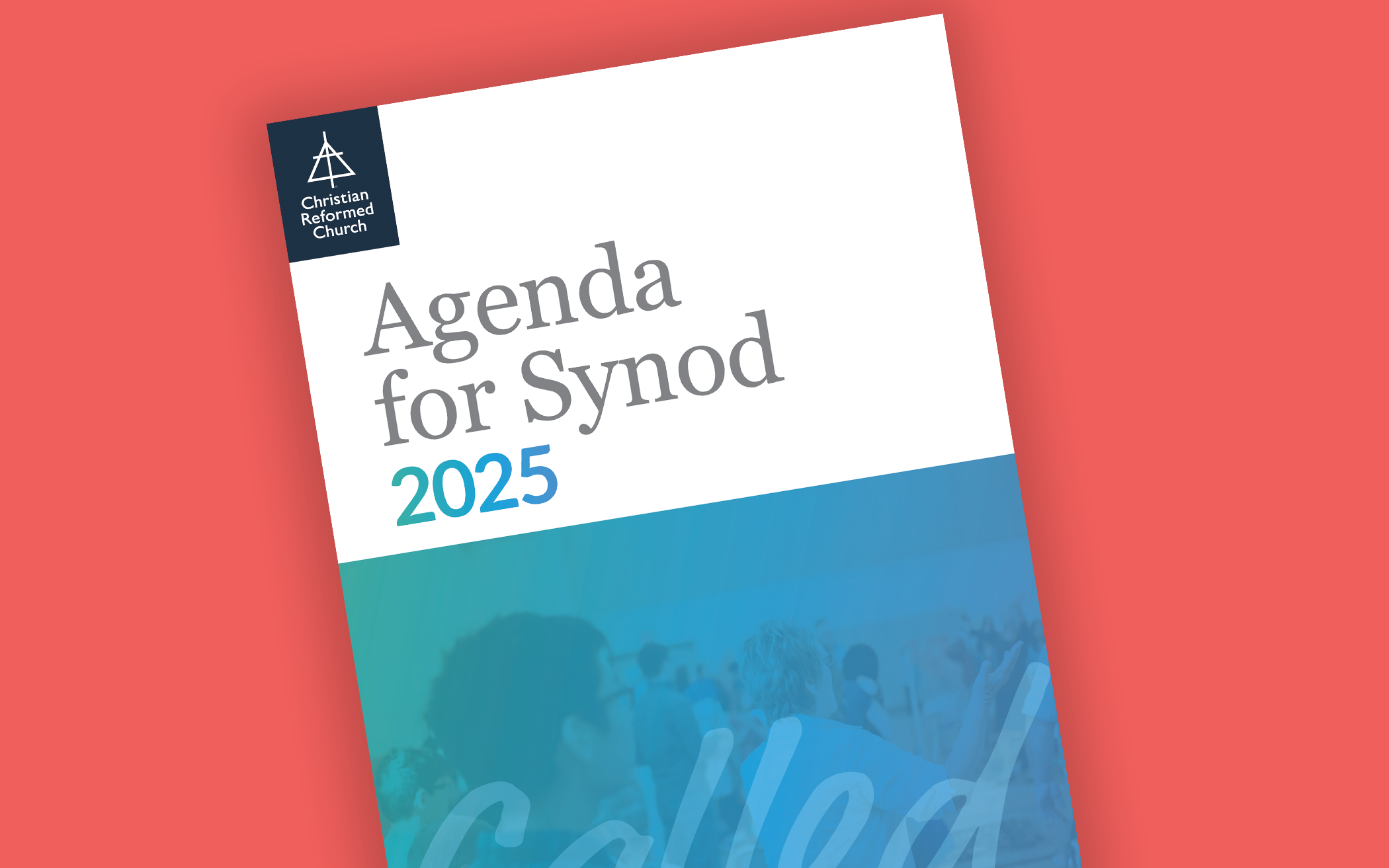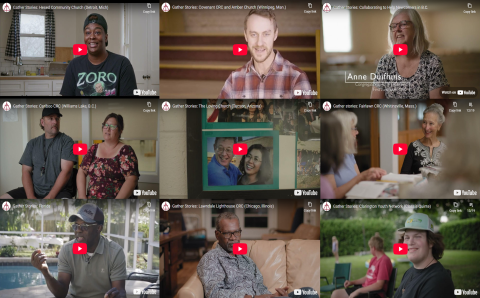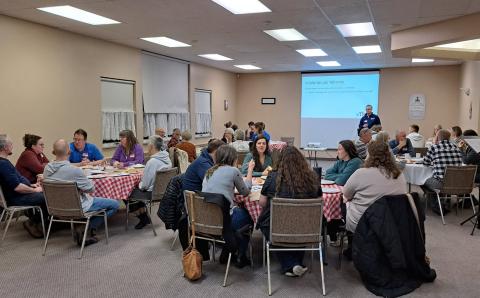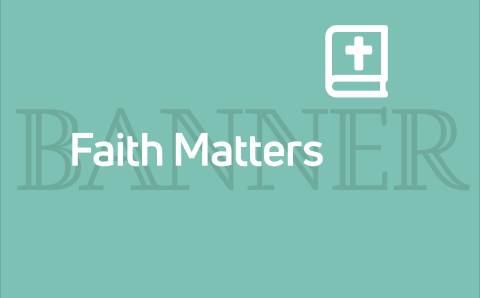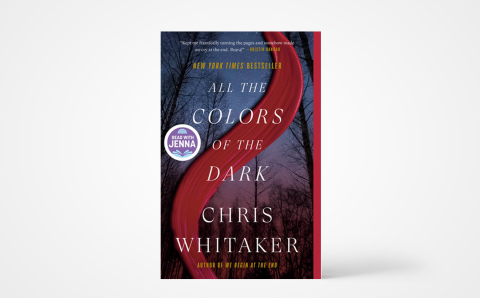After a convening by video conference to elect the officers of synod May 28, Synod 2025 will meet June 13-19 on the campus of Redeemer University in Ancaster, Ont., with First CRC in Chatham, Ont., as the convening church. Synod last met at Redeemer in 2012.
Synodical Services will stream the plenary sessions, beginning with the May 28 officers election. Find the schedule and the webcast at crcna.org/synod/webcast.
Delegates to Synod 2025 have a somewhat smaller agenda than those of the past three synods, but the 431 pages do include some significant matters, including three study reports, reports on the work of the Council of Delegates, recommendations from the standing committees of synod, 29 new overtures (formal requests), one deferred from 2024, and eight communications from classes, congregations, or individual members of the CRCNA. Here’s a summary of what’s to come.
Task Forces
There are three reports in a task force section of the agenda: one on assisted suicide, one on virtual churches, and one to clarify distinctions in synodical pronouncements, decisions, reports, positions, and advice.
In 2023 synod appointed a task force “to make a definitive and comprehensive report on the practice of assisted suicide in all its forms” (Acts of Synod 2023, p. 981). The group’s report recounts the current context noting jurisdictions in which medically assisted suicide is legal—in all of Canada and to varying degrees in about 15 states; lays out a Reformed theological framework; and offers recommendations for pastoral care, including practical resources such as a list of hymns and prayers for ministering to the dying. The task force understood its driving question to be “Given the growing availability and endorsement of medically assisted suicide, how should Christians think about this matter biblically, within the medical context, and in support of practical Christian living?” The writers encourage “compassionate palliative care and support of suffering, disabled, and/or dying people and their families instead of acting to cause death” (p. 282, Agenda for Synod 2025). The report makes 10 recommendations to Synod 2025, including that “synod remind CRC members to give generously of their time, treasure, and talents to work that supports people who are vulnerable and suffering … ” and “that synod recommit to engagement with public policy makers in advocating for hospice and palliative care that is readily available for every person in their jurisdiction.”
In response to a request to Synod 2023 to declare that a virtual church cannot be a true representation of church, synod instructed “the Office of General Secretary to oversee the creation of a report that gives thought to and a theological framework for the possibilities and parameters of a virtual church: ‘A church which, by design, meets only online’” (Acts of Synod 2023 p. 979). The resulting report cautions that “virtual churches be very intentional in explaining how they will administer sacraments in good order and how they will engage church discipline, given the challenges” inherent in gathering online. It presents six recommendations to synod, noting “that while churches ‘preferably’ gather in person for worship, fellowship, and mission, there should be room for intentional and ongoing experimentation within the CRCNA for digital ministry, including the planting of virtual churches.” And it reminds “that virtual churches would fall under the Church Order rules for emerging churches and would require the supervision of a local church council.” Another recommendation is that “synod encourage virtual-church plants, along with their parent church(es), to provide a clear ministry plan to their classis, including especially how they plan to fulfill the marks of the true church in their context” (Agenda for Synod 2025, p. 321).
A team, appointed by the officers of Synod 2024, “was asked to clarify the nature and extent to which synodical pronouncements are settled and binding with regard to members, officebearers, and churches” (Agenda for Synod 2025, p. 323). Agreeing that “such clarity is indeed important for the CRC to better understand what, precisely, we have covenanted to believe and to do together for the kingdom of God,” the team completed its task with a 10-page report, while acknowledging that “this team assignment comes, in part, because of an increasing number of relational challenges that cannot be met with administrative solutions” (Agenda, p. 329). To remedy that, the team offers what it suggests might be its biggest contribution—to ask the question, “What can we do to build mutual trust so that the body of Christ—or at least the part of Christ’s body that is the CRCNA—can move forward to do the ministry God requires of us?”
It offers: “Our denominational structure teaches us to consider the decisions of assemblies with respect and humility, and our conscience guided by the Holy Spirit constrains us to seek points of agreement that foster our unity and strength as the body of Christ. There is great value in the CRC understanding that does not force agreement with every doctrine or practice but allows for continued learning and growth into the matters we confess for both officebearers and other members. Identifying categories of synodical pronouncements cannot create those conditions; they can only be helpful insofar as those categories serve the goal of identifying our common areas of ministry. That task, in turn, requires mutual submission to one another that can come about only when we have first of all submitted ourselves to Christ. We must patiently and humbly seek the wisdom that comes from the Spirit to recognize how we can faithfully apply the shared understanding of Scripture that our confessions offer to us” (Agenda, p. 330).
The report also proposes three broad categories for synodical decisions: doctrinal affirmations, adjudicatory decisions, and doctrinal applications. And it concludes “that matters that are ‘settled and binding’ are those which have been discussed, debated, and adopted by synod and therefore obligate the churches to live up to the decisions the churches have made together. Local churches and classes ‘abide by’ these decisions—that is, they act in conformity with them and use them as guides for their ministry. Officebearers covenant to teach, preach, and act in alignment with synodical pronouncements, even if they are only obligated to agree with the doctrines taught in the creeds and confessions. Individual members agree to accept the spiritual guidance of the church as part of their commitment to respect their leaders and join with them in carrying out the ministry of the church, and they agree to ‘acquiesce’ in those decisions which they cannot actively support.”
Work of the Council of Delegates
The Council of Delegates—a 50-plus member board appointed by synod with a delegate from each of the denomination’s 49 classes—serves as the interim committee of synod, dealing with ecclesiastical matters that arise between meetings of synod and accomplishing tasks assigned by synod. It meets three times a year and reports to synod by way of the published agenda and a supplement to the agenda, issued closer to synod’s convening.
The report, without the added supplement that will come after the Council of Delegates’ May meeting, is 105 pages and includes condensed financial statements of the denomination’s agencies, institutions, and ministries (Appendix F, pp. 94 to 126); a proposed mandate for the finance and administration advisory committee of synod, as requested by Synod 2024 (Appendix E, pp. 92-93); an evaluation of the Easy-to-Read Bible from the Bible Translations Committee—it does not recommend it for use in worship (Appendix C, pp. 56-80); proposed updates to the Rules for Synodical Procedure “related to the use of technology, the virtual convening session of synod, staffing, and other items” (Appendix B, pp. 52-56); and updates to the Council of Delegates Governance Handbook (Appendix A, pp. 42-51). The Council is also asking synod to approve and appoint new members and accept revisions to the Church Order introduction (Agenda, pp. 32-33) and to Church Order Supplements for Articles 82-84 (Agenda, p. 34) and Article 15 (Agenda, p. 35)—changes reflecting decisions of past synods—as well as to ratify proposed changes to the Church Order and Its Supplements from Synod 2024 (Appendix D, pp. 81-91). The full list of recommendations from the Council of Delegates (pp. 38-41) includes appointing members to the Judicial Code Committee and approving a convening church of Synod 2026 as well as the host site for Synods 2027 and 2028.
Standing Committees
In addition to the Council of Delegates as its interim committee, synod has three standing committees that report directly to synod—Candidacy, Ecumenical and Interfaith Relations, and the Historical Committee. Their reports are found starting on page 223 of the Agenda for Synod 2025.
The Candidacy Committee is proposing changes to the process of appointing and approving Commissioned Pastors to a term call “contingent upon accountable progress toward completion of the requirements for ordination as a minister of the Word.” Sometimes called “bridge ordination” this process is governed by Church Order Article 24b. The Candidacy Committee wants to make clear this process is for “persons already ordained as commissioned pastors” and to “create a more accountable, healthy process for individuals seeking ordination through this route.” It is proposing synod adopt changes to both the Church Order supplement and the Commissioned Pastor Handbook (pp. 233-237, Agenda for Synod 2025). The Candidacy Committee also proposes a not-yet-formalized process for the “exceptional cases” in which a congregation’s search committee wishes to employ as a pastor an individual who is not yet trained or ordained in the Christian Reformed Church. The committee suggests it would be valuable “to allow a few years for classes to ‘test drive’ it (the process) and suggest any helpful modifications.” Calling it a “suggested process for hiring temporary unordained stated supply,” the Candidacy Committee includes five steps starting with a classis counselor meeting with a church’s council and the counselor discussing the plan with the Classis Interim Committee to receive concurrence “on the proposed ‘need’ to hire an unordained person as stated supply for a specified term” (p. 238, Agenda for Synod 2025). The Candidacy Committee’s report also includes results of a commissioned pastor survey with responses from 79 of the denomination’s 300 commissioned pastors (pp. 228-231, Agenda for Synod 2025). The committee intends to complete a review of the theological framework for the office of commissioned pastor in the fall of 2025.
The biggest item from the Ecumenical and Interfaith Relations Committee is its response to the assignment from Synod 2024 to “provide a recommendation to Synod 2025 regarding the ecumenical relationship of the Reformed Church in America as a church in communion with the CRCNA” (p. 884, Acts of Synod 2024). After seeking clarity from the RCA on specific questions from Synod 2024 (provided in an appendix to the EIRC report, pp. 253-254, Agenda for Synod 2025), and considering “the healthy and mutually beneficial partnership between the CRCNA and the RCA on many levels, including the exchange of clergy, union congregations, shared ministry, and mutual support,” the committee is proposing one small change to the Church Order supplement for Article 8-D, and if that is adopted, “that synod affirm the current status of the CRCNA’s relationship with the RCA to be that of a church in communion, and that the CRCNA synod, classes, and congregations respect and act according to the ‘orderly exchange’ provisions of Church Order Article 8 and its Supplement with regard to the calling of RCA ministers to serve CRCNA congregations.”
As of spring 2024 the EIRC notes “20 CRC ministers serve in the RCA and 46 RCA ministers serve in the CRC” and “there are nine ‘union’ congregations dually affiliated with both the CRC and the RCA.” It contends “the CRCNA may have ‘more to lose’ by revoking the status of the RCA as a church in communion.” (See Recommendation to Synod 2025: Remain in Communion with RCA, With Clarification, April 4, 2025.) One overture (formal request) and one communication in the Agenda for Synod 2025, both from Classis Iakota, address the same question, but with an opposite recommendation—that the CRCNA end the “in communion” relationship with the RCA (Overture 23 and Communication 7). Another communication to synod, from members of Third CRC in Kalamazoo, Mich., expresses “a desire to remain in ecumenical relationship as a church in communion with the Reformed Church in America” (Agenda, p.430).
Responding to requests from prior synods that the Ecumenical and Interfaith Relations Committee develop closer communion with the Alliance of Reformed Churches, members of the EIRC met with Alliance board and staff leaders in August 2024 and “proceeded to explore a closer communion via a Dec. 11, 2024, letter to the Alliance.” Pending a positive response to the EIRC invitation, the committee is recommending “that synod approve the Alliance of Reformed Churches as a church in communion” (p. 246, Agenda for Synod 2025).
As part of its report on multilateral relationships (starting on page 244 of the Agenda for Synod 2025), the Ecumenical and Interfaith Relations Committee notes preparations for the 27th General Council of the World Communion of Reformed Churches in October. General secretary Zachary King and EIRC member Eleanor Boersma Sarkany will attend as delegates. “As one of the influential founding denominations for the WCRC, the CRCNA has made extra efforts to provide financial support for the October 2025 gathering,” the committee notes. Meanwhile Synod 2025 will consider a request (Overture 24) from Classis Illiana to “review the CRCNA’s membership in the World Communion of Reformed Churches,” asking for a task force to analyse concerns including “questionable doctrinal statements” by the WCRC, “political and economic policy positions that are too specific for the institutional church,” and “a greater emphasis on social justice instead of the church’s primary calling of gospel proclamation and witness.”
The EIRC’s seven recommendations begin on page 251 of the Agenda.
The Historical Committee has no significant recommendations to synod this year, save thanking retiring members and appointing new ones. Its report to synod includes recognition of anniversaries of service for ordained ministers—notably Leonard Hofman, general secretary emeritus, would have celebrated 75 years of ordination in 2026. However he died April 11, after the report was published. The report also notes church anniversaries at 25-year intervals and includes a report from archives curator, William Katerberg, who notes activities of the past year. Of note: receiving “several hundred boxes of records from the CRCNA’s Grand Rapids offices due to the move from its 28th Street campus to its new facility” and “in relation to the 150th anniversary of Calvin University and Calvin Theological Seminary in 2026, Heritage Hall is planning to digitize Chimes (the university’s student newspaper) with the support of the Calvin University Alumni Association.”
Agencies, Institutions, and Ministries
Each of the Christian Reformed Church’s agencies, ministries, and its two educational institutions—Calvin University and Calvin Theological Seminary—reports to synod by way of the annual agenda (starting on page 127). This year Calvin University and the seminary were asked to report to Synod 2025 regarding policies for gravamina—expressions of concern or disagreement with part of the Reformed confessions—after Synod 2024 clarified the CRCNA’s own rules around gravamina. Calvin Theological Seminary’s Board of Trustees reports “that CTS has not had gravamina policies or a process of noting ‘exceptions’ since the separation into two boards for Calvin College (now Calvin University) and Calvin Theological Seminary, approved by synod in 1991.” As a reminder to synod of the confessional commitment of seminary faculty, the board includes its 2024 “Statement on Our Confessional Commitment by the CTS Faculty” in its 2025 report. The board is also presenting a faculty candidate, Jessica Joustra in the area of systematic theology, to Synod 2025 for interview.
A special report of the Calvin University Board of Trustees (Agenda, pp. 155-173) outlines proposed “revised confessional subscription frameworks that enhance alignment, transparency, and accountability (with the denomination) while reflecting and honoring the callings of trustees and faculty, as well as the practical dimensions of their service.” For faculty, the framework includes initial affirmation of only the ecumenical creeds with a three-year period of mentoring and development in the Reformed tradition’s Three Forms of Unity; annual reaffirmation of confessional commitments; opportunity for two- to three-year periods of discernment and mentoring for confessional difficulties; and “permitting some indefinite exceptions only after at least six years of service—the typical timeline to tenure—and a period of discernment and mentoring that would feature serious theological study and prayerful consideration, after which ongoing service at the university would still require alignment of personal and professional conduct” (Agenda, p. 165).
The trustee alignment framework has a tiered alignment model, “which ensures that the majority of trustees are fully aligned with synod’s confessional expectations while allowing for measured flexibility” to select trustees appropriate to maintaining governance sustainability and effectiveness. “Convictional alignment with the denomination’s standards and synodical interpretations will be the standard for Classis Region Trustees, who already have the established expectation of membership in a CRCNA congregation,” the report says. For At-Large and Alumni Trustees, there will be “preference for convictional alignment, with clear expectations of conduct aligned with full support for the CRCNA standards and synodical interpretations.” This is consistent with current practice, the report says. Like the faculty commitments, “all trustees will participate in annual active reaffirmation of confessional commitments.” Synod will receive the report and decide whether it's sufficiently in line with synod’s expectations.
Calvin’s report recommits the university to working through the already established channels of communication and collaboration—including the Council of Delegates’ Connections Committee and the denomination’s Ministries Leadership Council. “We believe that these are opportunities to enhance mutual understanding, and if any of these channels require change to further strengthen communication and collaboration, we are willing to work together to make those modifications. Making the most of these channels will afford the churches of the denomination a greater opportunity to learn about, with, and from Calvin University, all the while affording the university the opportunity to learn about, with, and from CRCNA churches” (Agenda, p.167).
A seven-page report from Canadian Justice Ministries (Agenda, pp.174-180) recaps the work of the Centre for Public Dialogue, Indigenous Ministry, and Intercultural Ministry in Canada. These ministries are governed by the Canadian Ministry Board and don't report to synod, so there are no recommendations. Since 2010, reports from what were then known as the Committee for Contact with the Government and Urban Aboriginal Ministries have been included in the agenda as information. Before that they were shared with synod through the Board of Trustees (now Council of Delegates) report.
Reports from the CRC Loan Fund (Agenda, pp.181-182) and Pensions (Agenda, pp.183-187) don’t include any major recommendations for synod to address.
The report from ReFrame Ministries (Agenda, pp.188-194) has no recommendations for synod and notes that “recommendations on financial matters are included in the report of the Council of Delegates and will be presented to synod by way of the Finance Advisory Committee.” The report’s ministry reflections were written before recent cuts to ReFrame programming. Agenda readers might notice reference to Rev. Sergei Sosedkin as Russian-language international ministry leader and to English-language programs Church Juice, Think Christian, and Family Fire. The Russian-language ministry was suspended and the others ended as of April 14.
Resonate Global Mission reports on its efforts in Global Mission, Local Mission, and Church Planting (Agenda, p. 195-203). It includes a recommendation that synod encourage Christian Reformed congregations to recognize specific Sundays to pray for and to receive an offering for Resonate. The report notes that “church planting is the area in which our denomination is experiencing the most growth.” It reports having planted 11 new churches last year, and in “fiscal year 2025-2026 Resonate expects to continue partnerships with 53 church plants and to start 33 additional new partnerships” (Agenda, p. 198).
Thrive, the CRC’s ministry to encourage and equip local Christian Reformed congregations formed in 2023, presents its second report to synod starting on page 204. The relatively new agency is asking synod to “remind all Christian Reformed congregations that Thrive exists ‘to provide expertise, wisdom, and compassionate support to congregations while remaining attentive to a wide range of opportunities and challenges facing the church today’; and that synod encourage ministry leaders and CRC members to reach out to Thrive for support” (Agenda, p. 208).
The report of World Renew, the diaconal agency of the Christian Reformed Church, is found on pages 210-221 of the Agenda for Synod 2025. Its only recommendation is “that synod commend the work of mercy carried on by World Renew and urge the churches to take at least four offerings per year in lieu of ministry share support.”
Overtures
Synod, as the broadest assembly of the Christian Reformed Church, has rules for how the classes, congregations, and individual members of the CRC can interact with it. Described in the Rules for Synodical Procedure, an overture is a formal way to request “the adoption or amendment of a policy or other legislative action by the assembly.” Thirty of these are included in the Agenda for Synod 2025, starting on page 335.
Overtures 1 and 2 deal with the transfer of a congregation from Classis Hackensack to Classis Hudson (Agenda, p.337).
Overture 75, deferred from Synod 2024, originally deferred from Synod 2023, is asking for “a study committee to evaluate our (the CRC’s) church polity in light of the Scriptures, our theology, and our history, with the goal of clarifying the relationship between the council, classis, and synod.” The overture is looking for recommendations for structural changes, including recommendations for changes to Church Order, that flow from an analysis of biblical and theological underpinnings of polity.
Two other overtures—3 and 27—deal with Church Order matters. The Council of Meadowlands Fellowship CRC in Ancaster, Ont., is asking synod “to amend the Church Order to prohibit concealed handguns at all ecclesiastical assemblies, regardless of local civil laws” (Agenda, p.338). Classis Heartland wants synod “to add a supplement to Church Order Article 3 to include a discipleship/educational component for all offices, including those of elder and deacon” (Agenda, p.395). Aiming to ensure officebearers are equipped “with the tools needed to fulfill the tasks of the offices to which they have been called,” Heartland suggests: “The church shall complete training prior to or within six months of ordination for all officebearers, including a study of the Covenant for Officebearers, the creeds and confessions, church polity, and the ministry tasks for their particular office so as to ensure that individuals are prepared and equipped for the weighty tasks that each office requires.”
Overture 25 (Agenda, p.392), also from Classis Heartland, wants to see Thrive ministries “focus on officebearer training in the coming year, including collating and developing materials to be used at the classical and congregational levels.”
Also focused on training, Overture 26 from Classis Heartland, asks synod “to encourage every church within the CRCNA to identify, train, and maintain an individual with a license to exhort in their church by Synod 2027” (Agenda, p.393). Overture 4, adopted by Classis Central Plains and Classis Rocky Mountain, concerns care for pastoral spouses, encouraging “each of the churches to support the spiritual health of pastoral spouses” through financial resources and by other means (Agenda, p.341).
Several of the overtures to Synod 2025 relate to decisions of Synod 2024. Overture 11 from Classis Ontario Southwest and Overture 13 from the council of Covenant CRC Winnipeg want synod to reverse or repeal the requirement to re-sign the Covenant for Officebearers. Overture 12 asks synod “to remove the word ‘fully’ from the phrase ‘fully agree with the Word of God’ in the Covenant for Officebearers” (Agenda, p.365). And in Overture 15, Ontario Southwest asks that synod “seat delegates from classes that have not implemented the annual re-signing of the Covenant for Officebearers” (Agenda, p.373).
Overture 10 from Classis Grand Rapids South references Article 76 of Acts of Synod 2024 (p. 891). The request says the statement that churches demonstrate “a commitment not to recognize same-sex marriage as ecclesiastically valid, either in officiation or any manner of blessing a wedding rite or a baptismal rite” might have caused confusion and asks synod to affirm the local consistory’s ability to discern a baptism request, upholding Article 56 of the Church Order that the primary criterion for baptism of a child is that “the covenant of God shall be sealed to children of confessing members” (Agenda, p.357).
Overtures 14 and 16 to 20 all relate to the decisions of Synod 2024 about gravamina—expressions of difficulty with a point of church teachings. The council of Palo Alto (Calif.) CRC suggests the Synod 2025-approved supplement to Article 5-a of the Church Order “is internally inconsistent and in need of revision” (Agenda, p.371). In Overture 16, the Council of Ferrysburg Community Church of Spring Lake, Mich., asks synod to revise the guidelines for the gravamen process to give discretion to local councils to “set their own timelines for the resolution of gravamina” and to “nominate elders and deacons who have a confessional difficulty but are willing to submit to the gravamen process outlined by Synod 2024” (Agenda, p.375). Classis Columbia wants synod “to create a new category of gravamen called a confessional-submission gravamen … in which an elder or deacon expresses personal difficulty with the confession but does not call for a revision of the confessions. The individual agrees to publicly support the teachings of the CRCNA and to avoid creating division in the church” (Agenda, p.377). In a similar vein, Classis Toronto asks synod to “create the category of a ‘Formal Act of Confessional Submission’ … a means through which an officebearer who has submitted a confessional-difficulty gravamen and has completed ‘a process of learning’ regarding the confession in question, and whose intellectual difficulties are not resolved, has the potential to decide whether to make a Formal Act of Confessional Submission or to resign from office” (Agenda, p.381). Classis Southeast U.S. wants an amendment to alter the time frame for discipleship of elders and deacons who may have a confessional difficulty to not “exceed two term limits” instead of “not exceed three years” (Agenda, p.379). And the council of The Journey congregation in Longmont, Colo., wants synod “to retract the decision that council members who have submitted a confessional-difficulty gravamen to their council are not eligible to serve in classical or denominational roles and functions” (Agenda, p.882).
Pertaining to discipline, Overture 21 from Classis Iakota asks synod “to address the matter of congregations and classes in a state of defiance” of synod’s rulings, requesting special discipline “to bring them back into fellowship with the CRCNA following the outline of Church Order Article 84” (Agenda, p.385). In Overture 22, Classis Northcentral Iowa, citing the example of the parables in Luke 15 about celebrating “the recovery of something lost,” requests “to have a feast of some kind to celebrate the repentance and return of those brothers and sisters who came under discipline as defined by the acts of Synod 2024.”
Overture 8 from Classis Zeeland notes the 1,700th anniversary of the Nicene Creed and asks synod “to celebrate the doctrinal clarity provided for Christ’s church in that creed, and to provide further instruction for our churches on the important doctrinal teachings found in that creed” (Agenda, p. 356).
In Overture 9 Classis Hackensack asks synod to update paragraph five of the Covenant for Officerbearers to include the Belhar Confession. Hackensack cites Synod 2017’s adoption of the Belhar Confession as a contemporary testimony for the Christian Reformed Church. “As such, the Covenant for Officebearers should be updated to include it alongside the singular mention of the witness of Our World Belongs to God: A Contemporary Testimony” (Agenda, p.356).
Overtures 5 and 6 relate to The Banner and its mandate. The council of First Christian Reformed Church of Artesia, Calif., is asking for a full rewrite of The Banner mandate “in such a way as to foster strict adherence to our confessional documents … (and) require that The Banner produce nothing but edifying material that promotes unity around our confessions, faithfulness to Christ and his gospel, and affection for our Savior” (Agenda, p.346). Classis Heartland is asking for specific amendments to the synodical mandate and guidelines of The Banner “to reflect its representative public nature” (Agenda, p.348). This would address “concerns with how The Banner represents the denomination on public platforms despite the lack of clear guidance on this in the (current) synodical mandate.”
Overture 7 from Classis Zeeland concerns positions for denominational boards. Zeeland wants synod “to create a new Synodical Advisory Committee whose sole purpose is to interview and make specific recommendations to synod for all proposed denominational board positions to be voted on by synodical delegates—boards of institutions, agencies, and ministries, and the Council of Delegates—including new appointments as well as reappointments” (Agenda, p.352).
Overture 29 from Classis Southeast U.S. asks synod “to direct the general secretary, the Resonate Global Mission director, and the Church Planting Core Initiative to reprioritize church planting within the denominational budget” (Agenda, p.402).
Overture 28 from the Council of Meadowlands Fellowship CRC in Ancaster, Ont., has three requests for synod, along with specific instructions on the process of evaluating them. It wants synod to “Envision the CRCNA as two distinct Christian Reformed Churches, one in Canada and one in the United States; Make the changes necessary for this ecclesiastical reorganization to be accomplished; (and) Task the U.S. Ministry Board and the Canadian Ministry Board with rewriting the relevant joint ministry agreements to ensure continued cooperation and collaboration among agency staff”(Agenda, p.396). “In a concrete demonstration of respect for the weighty issues raised in this overture, and to give greater confidence in the result by way of full transparency,” Meadowlands Fellowship’s council is requesting that two advisory committees, one made up of synodical delegates from the U.S. and one made up of delegates from Canada, “deliberate in committee independently and also report on this overture on the floor of synod independently.” It also requests, “At the time of the voting on this overture, the tally of votes by the delegates’ country of origin will be made known.” Vote tallies are ordinarily only disclosed if a delegate requests it of the chair, and no demographics are ever shared. Synods also typically deliberate and decide on matters before them on their designated authority—with the option of deferring to a subsequent synod if unable to complete the work. The Meadowlands Fellowship request wants the outcome of the deliberation and vote by delegates to “be referred to the churches for confirmation.”
Communications
According to the Rules for Synodical Procedure, “a communication is a document presenting information, ideas, thoughts, opinions, complaints, or objections for consideration of the assemblies.” Distinct from an overture, “an assembly is not required to take any action with respect to a communication.”
Synod 2025 has eight communications to consider, spanning pages 405-431:
- the two mentioned earlier about the ecumenical relationship with the RCA
- one from Classis Red Mesa protesting “the changes to the gravamen process ratified by Synod 2024” (Agenda, p.405)
- one from Classis B.C. North-West, sharing “the impact of the discipline related and gravamen-related decisions from Synod 2024” (Agenda, p.407)
- one from Classis Minnkota providing rationale for its delegates’ protest of the ordination and seating of women at synod (Agenda, p.424)
- one from the Council of Church of the Savior CRC in South Bend, Ind., detailing circumstances of a mishandled confessional revision gravamen and a debt of process owed to Church of the Savior that the church recognizes as “a debt that cannot be repaid at this time” (Agenda, p.427)
- one from Classis Grand Rapids East discussing the possibility of “congregations from neighboring classes to join with the remaining Classis Grand Rapids congregations to form a new ‘Grand Rapids City Classis’” (Agenda, p.406)
- one from the council of Washington D.C. CRC to add an essay by member Ryan Struyk to the denominational conversation about faith and sexuality (Agenda, p.409)
Synod 2025, the annual general assembly of the Christian Reformed Church in North America, is meeting June 13-19 on the campus of Redeemer University in Ancaster, Ont. The Banner will provide daily coverage. See crcna.org/synod for the agenda, advisory reports, recordings of plenary sessions, and to subscribe to the daily Synod News email.
About the Author
Alissa Vernon is the news editor for The Banner.

